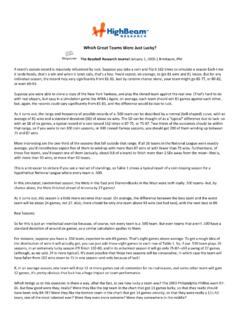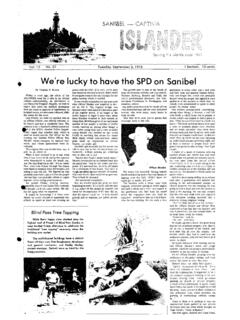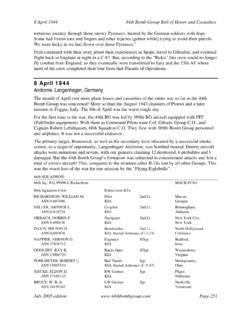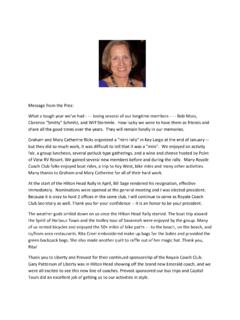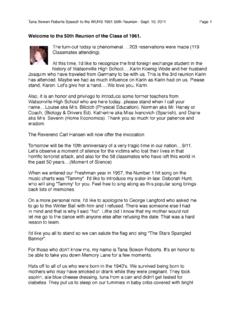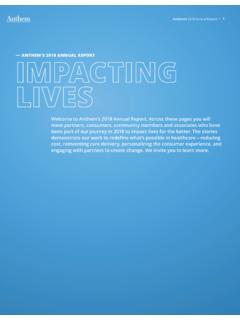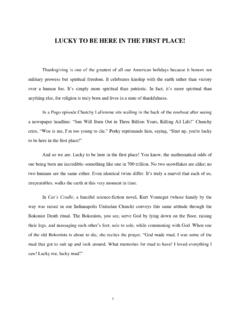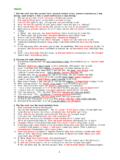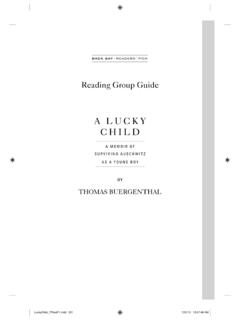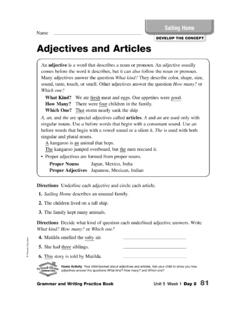Transcription of 'We were very lucky' - vnbp.org
1 ' we were very lucky ' April 17, 2005 Son Lam found the plaque he made 25 years ago on a return trip to the site of the refugee camp on Bidong Island, Malaysia. Photo: Eddie Jim The Vietnamese arrival in Australia 30 years ago is one of this country's great stories - a mass migration from a country ruled by terror at worst and uncertainty at best to a place that was politically stable, where there was no threat from the police or government of an early-morning arrest raid, and where the people were , largely, welcoming and kind. Of course there was racism and intolerance towards them - they were new, they looked different, they were known as hard workers and in Melbourne they congregated in what were often then called "ghettos" in Richmond and Springvale.
2 They settled in these "ghettos" because many spoke no English, were looking after the very young and very old in the type of extended family uncommon to white Australians, and knew few locals. After the pain and terror so many of these people had known, coping with a hostile reception from some Australians wasn't the worst thing they'd encountered. The relatively warm reception the Vietnamese received from the Fraser Liberal government - the first wave in the late 1970s and the second in the mid-1980s who arrived under the family reunion scheme - stands in contrast to the refugee policies of the current Howard Government. " we were very lucky to be so welcomed in comparison to asylum seekers today being detained in Australia," says Hung Tran, who fled Vietnam in 1984 in a boat with 174 others.
3 "The international community seems less prepared now to open their hearts and their arms." Andrew Doan's experience was not uncommon. On arrival in Melbourne, his family rented a three-bedroom house in Oakleigh and Andrew went to Oakleigh Primary. At one point 14 family members lived in the house. He was looked after by his siblings, who would make him butter and sugar sandwiches (the other kids had ham and cheese). At school he was teased for being different and having no English. He was called "Ching chong" and "Nip". "Every day you get called names. You've got to do something, otherwise they keep picking on you. But I was small and couldn't fight." In assembly one morning, Andrew and his brother were asked to stand up.
4 "We didn't know what was going on so we didn't stand up. A Greek boy saw we were a little bit lost and came over and said 'Where are you from?' and he looked after us a bit from there." Andrew liked Melbourne, but remembers the fear of the new arrivals. "You'd go round and see signs saying 'Stop the Asian Invasion' and you'd feel terrible, like you didn't belong. In 1985 we were new, different skin, looked different. People slowly began to accept our culture." The Doan family thrived in Melbourne. Andrew, recently married, works in information technology. He lives with his mother. "I want to move, but I love and respect her and I feel I should stay." His wife lives in a unit in Dandenong. "I move between them.
5 " His siblings are doctors, dentists, accountants, computer sales people, and a newsagency owner. Two brothers returned to Vietnam and set up businesses. "We came here with nothing and we worked extremely hard," Andrew says. " we were typical of the Vietnamese who came here. We really appreciated the chance we got in Australia." The tiny two-year-old who hovered between life and death is now a successful academic. Kim Huynh's family moved to Canberra, where they have no family. "It's just been the four of us," Kim says. Accepted warmly into the community, Kim and brother Thac thrived. " we were larger, we were good at sport, we were popular, we didn't suffer racism," he says. There was only one Australian who resisted them.
6 "There was a truckie who lived next door who didn't like us - the racist, ignorant bastard. He slashed our tyres, he slapped Mum and me one day. The church arranged for us to move to another house." Melissa Chew has two children, a boy, eight, and a girl, four. She works in a bank. She is bubbly and vibrant, and feels grateful to have survived. "I'm happy today. I wake up in the morning, I see the sun, I'm very happy." Father Anthony Quang works in Melbourne with young people as the rector of the Don Bosco youth centre and hostel, and at weekends at St Johns, East Melbourne, working with mostly Vietnamese constituents. He says: "We are very grateful to be able to live in Australia." Luu Glenister married in 1995.
7 She has an eight-year-old son, Elliott, who attends Ivanhoe Grammar. "When I was living in the camp, I always imagined I would live in Australia." Her husband wanted to come on this trip to see where she lived, but stayed at home with Elliott. Luu says: "This represents my freedom." Back in Sydney, Son Lam's wife Phuong, who was unable to go on the trip, was delighted to see the thanksgiving plaque Son had brought home. "She was very pleased for me," he says. Thanh Thai searched around the grave sites of the Vietnamese boatpeople on the Malaysian coast but did not find the grave of his aunt, who drowned aged 35, just off the beach when the boat she was on capsized. So many graves were unmarked, and Thanh couldn't be sure of the exact area.
8 "I was very disappointed. My aunt had helped to arrange the trip. The people on her boat loved her because she looked after everyone." As an architect, he will continue his grand project, a labor of love and tribute: to keep building his house in Footscray in the shape of a boat, to honour the young woman who was so loved by her 54 fellow refugees and who was so close to freedom.
